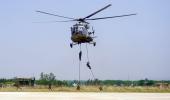'Whatever we do, the purpose will be to re-establish deterrence.'

After the terrorist attack in Jammu and Kashmir's Pahalgam killed 26 people, mostly tourists, India-Pakistan relations have sharply deteriorated.
The attack has prompted diplomatic downgrades and treaty-level measures and raised the spectre of escalation amid a widely anticipated Indian military response to Islamabad's continued support for cross-border terrorism.
Against this backdrop, former diplomat Ajay Bisaria -- India's last high commissioner to Pakistan -- sat down with Business Standard's Bhaswar Kumar and Archis Mohan to unpack the timing of the attack and the response it demands from India.
During his tenure as India's envoy to Pakistan from 2017 to August 2019, Bisaria had a front-row seat to India's response to the 2019 Pulwama attack and argues that India now needs to re-establish deterrence.
This interview was conducted before Operation Sindoor.
How do you view the timing of the Pahalgam attack?
India did establish deterrence after the 2016 surgical strikes and 2019 Balakot operation, which is why we went for six years without any major terrorist attack, which were frequent before. But deterrence doesn't hold forever and can be eroded by other factors, such as the fact that the world has changed since 2019.
India needs to now re-establish deterrence and impress upon the Pakistan army again that there is a cost to supporting terrorism.
The primary change that has occurred is in the internal situation in Pakistan.
Things have become so desperate for the Pakistan army that it decided to take this risk, despite the deterrence previously established by India.
Pakistan's army chief Asim Munir is beleaguered -- he has jailed former prime minister Imran Khan, faces dissent within the army and is accused of rigging elections to prop up an unpopular government.
Munir also blames India for the deteriorating situation in Balochistan, and so on.

How does such a severe provocation align with Pakistan's stated shift to a geoeconomics-focused security paradigm?
This is about one man's search for power. It's all about army chief Munir's desperate attempt to stay relevant and to consolidate power.
'Geoeconomics' was former Pakistan army chief Qamar Javed Bajwa's doctrine, and Imran Khan was recruited into it. But Munir perceives a new reality, and the polycrisis he operates within dictates the way he acts.
His actions against Imran Khan and the rigging of polls have made the army the most unpopular institution in the country.
In fact, Munir has likely become unpopular even within the army itself. He has also gone ahead and effectively given himself a 10-year term.
So, despite the improvement in the Pakistani economy -- illusory and temporary -- his calculus may be that a limited war with India could benefit him.
He may have the risk assessment that he can manage such a conflict, despite all the risks of an Indian response and global condemnation. It is a high-cost strategy, no doubt.
What should India's next step be?
In many ways, we are back to the moment of 2019.
Pahalgam is today's Pulwama attack, but also more serious because it echoes the 2008 Mumbai attacks in its targeting of civilians.
The template we have adopted is the same as the one in 2019, but with one key difference.
We have taken an immediate series of steps. Back then it was action on the trade and visa fronts, but we hadn't reduced the size of the missions.
Today, I think the most serious step we've taken is putting the Indus Waters Treaty in abeyance.
I would call it a pause, since the move is to last till Pakistan renounces cross-border terrorism.
While we have not annulled it in the legal sense, it would be safe to say that Pahalgam has broken the Treaty's back.
This is a very serious signal from India, especially given how sensitive the matter is in Pakistan, where there is a prevalent narrative that India can block its water supply and dry it up.
I would argue that this step definitely adds to the deterrence. People in Pakistan will be asking themselves and their army whether this is a price worth paying.
While suspending the IWT is a reversible measure, it definitely adds to our leverage.
We are in fact witnessing a broad-spectrum response, including diplomatic and bilateral steps.
What may come next, along with the ongoing global diplomacy being employed by New Delhi, may be kinetic military action targeting terrorists. This will come at a time of India's choosing.

What form should the kinetic response take on the escalation ladder, relative to 2016 and 2019?
India has had two policy dilemmas in the age of Pakistan-sponsored terrorism, starting from the 1980s.
One is what to do after an attack. We tried coercive deployment after 2001, and international diplomacy after 2008, which I have argued wasn't enough.
Surgical strikes after 2016 and air strikes in 2019. We could today do some of this, a combination of all previous actions, or even something completely new. But, whatever we do, the purpose will be to re-establish deterrence.
The second policy dilemma is, when you're not in a post-terrorism situation, what do you do? What diplomacy do you employ? Do you engage with Pakistan or not? We've tried both those options.
My argument remains that while China may be India's primary strategic challenge, its primary adversary in terms of creating trouble is still Pakistan, and the current policy of strategic neglect is not the right policy to deal with them. Our composite response has to be such that we once again establish deterrence.
Feature Presentation: Rajesh Alva/Rediff











